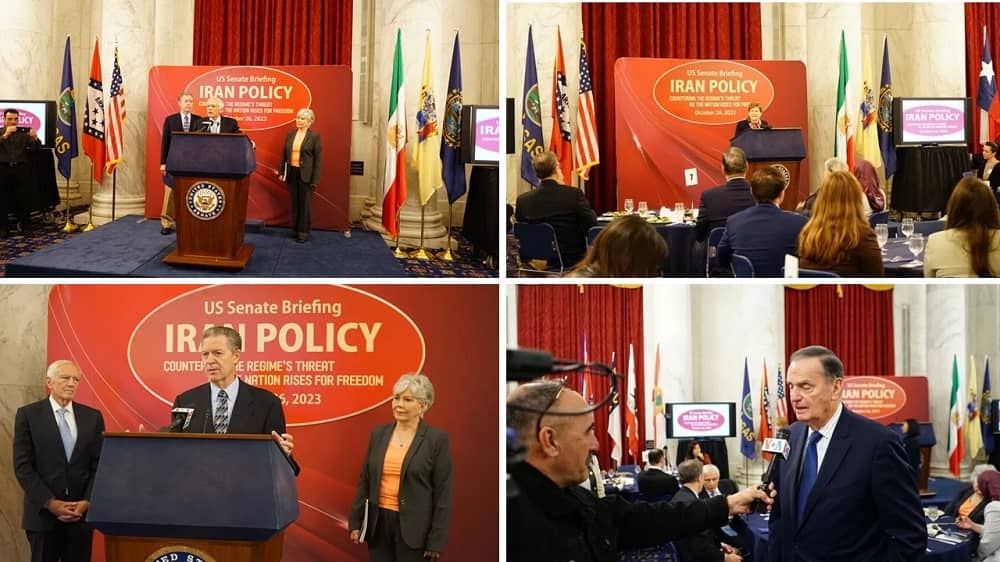
October 26, 2023: Senate briefing in Washington, D.C. saw bipartisan leaders gather to address the Iranian regime and Middle East unrest. Notable speakers included Mrs. Maryam Rajavi, President-elect of the National Council of Resistance of Iran (NCRI), and Senators Jeanne Shaheen, Bob Menendez, and John Boozman.
Mrs. Rajavi highlighted the Iranian regime’s role in Middle East chaos and urged addressing its warmongering actions. Senators emphasized Iran’s threat to peace, calling for support of democratic forces within Iran.
The speakers advocated for a firm stance against Iran’s aggression and expressed solidarity with the Iranian people’s struggle for a democratic Iran.
Excerpts of the speeches of the speakers in the Senate briefing are as follows:
Senator Jeanne Shaheen (D-NH) stood in unison with her fellow representatives, urging for transformative shifts within Iran to attain peace. She asserted, “The Iranian regime is solely fixated on self-preservation, hence their focus on oppressing their own citizens and inciting unrest beyond their borders.” Recognizing the broader threat posed by the Iranian regime, Senator Shaheen, a prominent figure in the Armed Services Committee, highlighted, “The Iranians battling the brutality and oppression of the Tehran regime, alongside the people of Ukraine, are fighting for their very survival.” She further emphasized the unique insight of those at Ashraf 3, acknowledging, “No one comprehends the extent of the Iranian regime’s reach or the necessary resistance against their harmful influence better than our allies there, who persist in combatting authoritarianism.”
Senator Bob Menendez (D-NJ) underlined two central truths regarding Iran: “Firstly, that the regime poses a substantial threat, operating as a brutal autocracy governed by ayatollahs who resort to abduction, torture, and even murder to maintain their power. Secondly, the undeniable truth is that the Iranian populace aspires for freedom and change.” Proposing a way forward, Senator Menendez articulated, “The United States must stand in solidarity with the Iranian community… The vision of an all-encompassing, secular, democratic rule of law in Iran, as advocated by Madam Rajavi, is the aspiration we should collectively strive for and endeavor to actualize.”
In his message, Senator John Boozman (R-AR) expressed unwavering support for the Iranian people and their pursuit of peace. He pledged his dedication to exerting maximum pressure on the regime to halt its malign activities and thwart the development of a nuclear weapons program.
General James Jones, the initial National Security Advisor to President Obama, urged the United States to reject any policy of appeasement toward the Tehran regime. Highlighting the regime’s false portrayal as promoters of peace while destabilizing the Middle East with terrorism and extremism, General Jones stressed the need for active support for the Iranian people’s quest for freedom. He proposed a global policy shift away from appeasement, favoring a democratic republic in Iran devoid of religious or monarchical rule as the true pathway to regional peace.
Ambassador Sam Brownback, the former United States Ambassador at Large for International Religious Freedom, emphasized the Iranian people’s longing for peace and freedom. He asserted the necessity of supporting internal forces within Iran and advocated for a regime change in Tehran led by the Iranian populace with the backing of Western nations as the sole path forward for peace in the Middle East.
General Wesley Clark stressed that the Iranian regime lacks legitimacy and emphasized the existence of an alternative to the ruling clerics in Iran. Acknowledging the endurance and advocacy of the Iranian Resistance, General Clark urged the global community to recognize this alternative without resorting to conflict. He highlighted the organization’s commitment to democratic governance, religious freedom, and human rights as crucial elements for a better Iran.
Linda Chavez emphasized the courage exhibited by the Iranian people in confronting their regime, underscoring the need for moral support from the United States, Europe, and other democratic nations.
Moderating the Senate briefing on behalf of OIAC, Ana Sami emphasized the urgent necessity for a shift in the current U.S. policy towards Iran. She stressed the importance of recognizing the Iranian people’s right to replace the religious dictatorship ruling Iran and establish a secular, democratic, non-nuclear republic founded on the separation of religion and state.